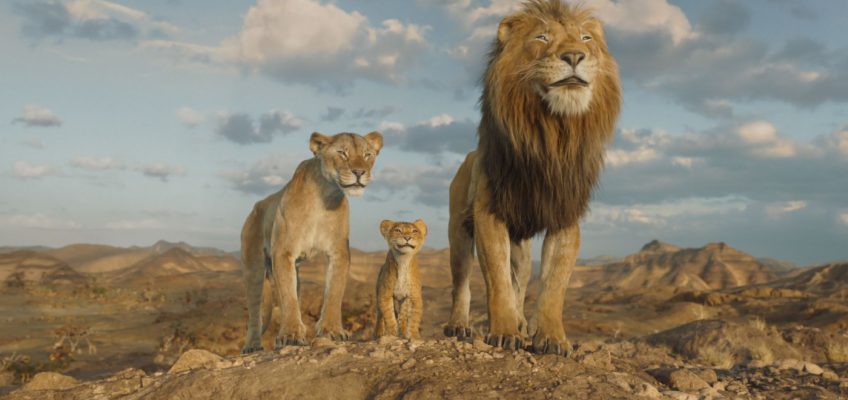Barry Jenkins truly is a miracle worker. The Oscar-winning director of the intimate indie “Moonlight,” the romantic period drama “If Beale Street Could Talk” and the Amazon series “The Underground Railroad” isn’t the first filmmaker who comes to mind to tackle the prequel to Jon Favreau’s poorly received 2019 remake of the beloved animated feature “The Lion King.” And yet, somehow, Jenkins and his creative team — including his longtime collaborators, cinematographer James Laxton and editor Joi McMillon — make magic with “Mufasa: The Lion King,” offering up a visually dazzling and emotionally affecting coming-of-age story about Simba’s father, whose death traumatized an entire generation of kids in 1994.
There were elements of the 2019 “The Lion King” that were traumatizing too, having to do with the conceit of transposing this familiar story (“Hamlet” for kids) onto photorealistic animals, who then sang. It’s simply not right for a startlingly lifelike, digitally conjured apex predator to open their jaws and belt out a Broadway-style tune, though French philosopher Jean Baudrillard would certainly have had a field day with the horrific apparition.
That mental hurdle still presents as an obstacle in “Mufasa,” as we’re jarred into the reality of this cinematic world where stunningly accurate representations of African wildlife speak — nay, elocute — and of course, sing (songs by Lin-Manuel Miranda). It’s a long leap to make, but it’s a testament to the absorbing story and soaringly gorgeous and beautifully staged visuals that the leap isn’t so difficult to land.
The script is also by 2019 “The Lion King” writer Jeff Nathanson, but liberated from penning a line-for-line remake of the original, he is able to imagine the story of how Mufasa and Scar became brothers, and then how they became enemies. We’re plunged into the action right away, so there’s not much time to dwell on the speaking or the singing, as we keep up with the harrowing journey of the tiny lion cub Mufasa (Braelyn Rankins; Aaron Pierre voices the grown Mufasa).
Mufasa’s coming of age is framed by Rafiki (John Kani), the mystical mandarin, imparting the tale to Kiara (Blue Ivy Carter), the cub of Simba (Donald Glover) and Nala (Beyoncé Knowles-Carter). Much like the other blockbuster fantasy film of this fall, it’s the story of how two famous enemies were once friends, or in this case, brothers.
Pumbaa (voiced by Seth Rogen), left, and Timon (Billy Eichner) in Disney’s live-action “Mufasa: The Lion King.” (Disney/TNS)
A young Mufasa is separated from his parents in a great flood, and is rescued by young lion Taka (Theo Somolu; later, Kelvin Harrison Jr.) and his mother, Eshe (Thandiwe Newton). As a stray, Mufasa is not accepted by Obasi (Lennie James), their pride’s king, so he is trained to hunt with the lionesses, while Taka is groomed to take over his royal birthright, though the young cubs quickly become brothers. Their pride’s uneasy harmony is disrupted when an invading pride of menacing white lions, led by Kiros (Mads Mikkelsen) begins to stalk and hunt them, seeking revenge for a young prince killed in combat.
So begins Mufasa’s journey to his destiny, which he never imagined, and to his rift with his brother, fueled by jealousy and bitterness. What Jenkins does so well with Nathanson’s script is make it emotionally palpable to an audience, with an intense focus on the faces of the lions. The technology allows for nuanced micro-expressions in the brows and eyes, while incorporating the animal behaviors that big cats use to communicate: nuzzling, swatting, clawing, caressing.
We’re able to connect with these animal characters during their harrowing adventure, and relate to the entire range of emotions along the way. There are smaller moments and big betrayals, and elements that make the story much more human and compelling in terms of the love triangles and double-crosses; the disappointments and the grief; the triumph and the joy.
And like the other big blockbuster musical of the fall, it’s a story about standing together to fight tyranny. This may feel a bit deflating (and even dated) in light of recent national events, but the message of uniting to fight each other’s battles because the next one could be ours could not be more bracing and potent, even if it feels already defeated in times like these.
But the true message of “Mufasa” is to never doubt Jenkins, even when he makes a choice that seems outside of his wheelhouse. As a kid, he said he watched “The Lion King” at least 150 times. He knows the characters and the story intimately, and in “Mufasa,” he expands the scope and range of this world, offering up a story that exists in the realm of “The Lion King” but doesn’t retread on old material (or desecrate it). Let’s pretend that the 2019 version never existed, because “Mufasa: The Lion King,” is the boundary-pushing prequel that the beloved original film deserves.
‘Mufasa: The Lion King’
3 stars (out of 4)
MPA rating: PG (for action/violence, peril and some thematic elements)
Running time: 2:00
How to watch: In theaters Dec. 20
Related Articles
TV Tinsel: Classics, new shows sure to be Christmas sweets on your screen
How R.E.M. transformed from scrappy college band to Hall of Fame rock group
New holiday rom-coms are here! 5 to watch this season
Tired of elves? Redditors recommend these alternative Christmas movies
Rock of ages: 2024 was a banner year for music by artists in their 20s, 80s and beyond


Leave a Reply